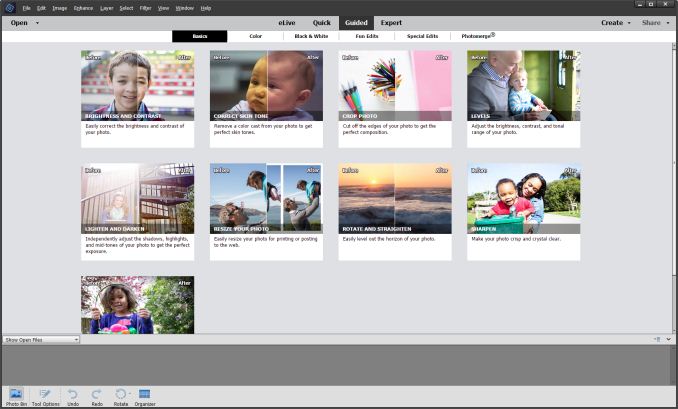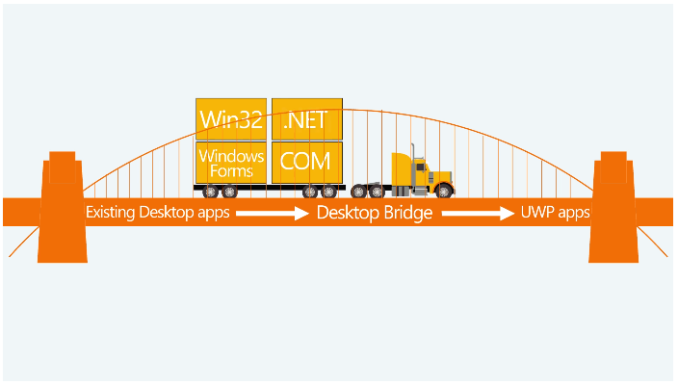Adobe Photoshop Elements 15 Comes To The Windows Store
by Brett Howse on November 25, 2016 11:45 AM EST- Posted in
- Software
- Adobe
- Windows 10

The Windows Store is Microsoft’s big bet, combining software purchases, updates, and installs into a single place. Although it continues to grow, it still doesn’t offer anywhere near the number of big name apps as iOS or Android. Windows still has a massive library of applications, or course, but they are bought, installed, and updated outside of the store.
Clearly one of the ideas is that Microsoft will take a cut on any app sales in the store, so there is motivation for them to make this succeed, but for the end users, it’s been well proven that a solid Store model works for ease of use, and especially updates.
Recently (and possibly today) Adobe Photoshop Elements came to the Windows Store, as pointed out by Paul Thurrott and Windows Central. This is an important app for the Windows Store, where previously only a much lighter version called Adobe Photoshop Express was available. Elements is not the crown jewels of Adobe’s suite, but it’s still an app that many people use.
Although we don’t have official confirmation of this, Adobe Photoshop Elements is almost certainly using Microsoft’s Desktop App Bridge, codenamed Project Centennial. Update 2016-11-28: Microsoft has confirmed this is using Project Centennial. This bridge allows developers to bring older Win32 apps to the Windows Store, and if they so choose, begin to convert them to the Universal Windows Platform. Although Centennial was announced quite a while ago, it wasn’t until the Windows Anniversary Update that Windows had all of the frameworks required. Photoshop Elements certainly isn’t the first Desktop Bridge app to make it to the store, but it’s surely one of the biggest.
By offering this through the Store, end users get the benefits of the store. The app is automatically updated through the store, so you won’t need any Adobe update services running on your PC, and best of all it can be installed on up to ten devices, rather than the two activations that you would get if you purchased this as a traditional software download.
Centennial also packages the app into a container, so the install process is incredibly quick. Elements doesn’t need to install for thirty minutes as it writes files all over your PC, and in your registry. Everything is kept in the container, which also makes uninstall very simple and much cleaner. I just installed Elements, and after the download was complete, it installed in just a few seconds.
With the launch, the software is also on sale for a limited time.
If the Windows Store is going to take off in a meaningful way, apps like these are going to be an important first step. With Windows 10 on over 400,000,000 devices now, there is an incentive for developers to leverage tools like the Desktop App Bridge to utilize the store. For me, the Store model has enough benefits that I would prefer to purchase an app like this through it. It’s worked before on the PC with stores like Steam and Origin as well, and by bringing big name Win32 apps to the store, Microsoft has an important tool to bring existing devs into their new platform.
Source: Windows Central, Thurrott.com











56 Comments
View All Comments
taisserroots - Friday, November 25, 2016 - link
So windows is essentially creating it's own repository years after apple realised linux distros had a good idea.damianrobertjones - Friday, November 25, 2016 - link
Sigh. Linux is the best, everything else sucks. Blah blah. /sWinterCharm - Friday, November 25, 2016 - link
Linux was never ever "the best". It has it's place, sure, but I'll tell you right now the biggest drawback is having to wrangle with the CLI whenever something goes wrong, and it inevitability will.negusp - Friday, November 25, 2016 - link
nah. The CLI is what makes Linux unique and inevitably awesome. If you can't handle it then you, quite simply, shouldn't be using linux.sorten - Friday, November 25, 2016 - link
"If you can't handle it then you, quite simply, shouldn't be using linux"That attitude and reality are exactly why Linux has never hit 1% of the desktop market. Most computer users can't set up a printer.
It is a great server platform, particularly considering the cost.
negusp - Friday, November 25, 2016 - link
This. Linux will never reach as wide an audience (discounting mobile OSes) as, say Windows, because most normal people are unwilling to learn how to use their own computers.Sad reality. I hope that the increased integration of computer science courses within middle and high schools help reverse the downward trend of tech-savvy but yet not-tech-savvy consumers.
ddriver - Saturday, November 26, 2016 - link
Linux as a computer operating system is excellent, far better than M$CR@P. Just look at Android vs competitors in the mobile market. It is without competition in the server and supercomputer market as well. It only sucks on the PC really...Where it lacks is on a GUI shell, which makes it a very lousy user operating system. All the major distros, regardless of whatever superlatives whoever may throw at them, are entirely pathetic at providing a decent user experience. I am a power user, and use Linux to a decent degree, and I find even the most allegedly "user friendly" distro totally appalling.
A "mere mortal" could not possibly deal with that, which I guess is true to some degree for windoze, but Linux is just plain out awful. I have to spend an hour typing in the terminal to get a new Debian install to work adequately. Ubuntu is a little better, or more accurately, a little less bad, but still no cigar.
Naturally, the lack of software doesn't help either. M$ have spent decades locking in software developers. Today it is a tad better, but back in the days it was practically impossible to write portable software, you had to chose a platform and stick to it, porting to another platform with its own APIs and idioms is a nightmare.
Worst part is that by the time Linux gets close to a good GUI shell it will probably be ruined. It is already heading that way and fast. Open is good, but with moderation, and Linux is currently too open for its own good. And Torvalds, as great as he might be at what he does, is a near-sighted, narrow-minded person as are pretty much all other influential figures at the foundation. They can't see what's truly good for Linux and are hopelessly stuck believing that it is openness, which will end up ruining it. I am fairly new to Linux, and I am already planning my departure from it for all workflows which allow it like I did with windoze, looking forward to either FreeBSD, potentially even a brand new OS from scratch.
sorten - Sunday, November 27, 2016 - link
Android isn't winning the mobile market because of technical excellence :-) It's winning the mobile market because it was the first non-Apple mobile OS for smart phones.ddriver - Sunday, November 27, 2016 - link
There was windoze CE a full 12 years before android, but it was complete garbage. Android is fairly decent, excluding a few niche omissions, for example low latency audio.The ecosystem is open enough, you can install applications at will, and you can run it without installing any google apps and services.
It is not really a matter of technical excellence either, Linux is technically excellent but that only gets it far in fields where technical excellency matters - servers, supercomputers, embedded, critical and real time applications. And while it is true that most people actually depend on this, it is indirectly and someone else's job, technical excellence doesn't do much about your average Joe's computing needs directly.
It is a matter of user friendliness and usability. Linux is very user unfriendly, and not too usable in a wide context. There are very few prosumer applications that run on Linux. Barely any contemporary AAA games.
The latter is also true for Android, which is why it ain't making too much gains on the desktop, it lacks the apps. What made it successful on mobile is that those devices are strictly oriented towards content consumption, so the lack of prosumer software doesn't really hurt adoption.
eddman - Monday, November 28, 2016 - link
"M$CR@P""M$"
"windoze"
Why do some of you feel the need to resort to below childish behavior to argue your point.
I expected FAR better from anandtech readers.